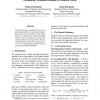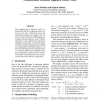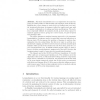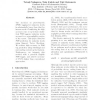NAACL
2007
13 years 6 months ago
2007
This paper describes a new grapheme-tophoneme framework, based on a combination of formal linguistic and statistical methods. A context-free grammar is used to parse words into th...
NAACL
2007
13 years 6 months ago
2007
This paper addresses the problem of classifying Chinese unknown words into fine-grained semantic categories defined in a Chinese thesaurus. We describe three novel knowledge-based...
LREC
2008
13 years 6 months ago
2008
A new approach to handle unknown words in machine translation is presented. The basic idea is to find definitions for the unknown words on the source language side and translate t...
COLING
2008
13 years 6 months ago
2008
This paper proposes a method for automatic POS (part-of-speech) guessing of Chinese unknown words. It contains two models. The first model uses a machinelearning method to predict...
COLING
2008
13 years 6 months ago
2008
Self-training has been shown capable of improving on state-of-the-art parser performance (McClosky et al., 2006) despite the conventional wisdom on the matter and several studies ...
ACL
2008
13 years 6 months ago
2008
This paper presents an approach to text categorization that i) uses no machine learning and ii) reacts on-the-fly to unknown words. These features are important for categorizing B...
ACL
2008
13 years 6 months ago
2008
The omnipresence of unknown words is a problem that any NLP component needs to address in some form. While there exist many established techniques for dealing with unknown words i...
AIMSA
1990
Springer
13 years 8 months ago
1990
Springer
A method for processing sentences which contain unknown words, i. e. words for which no lexical entry exists, is presented. There are three different stages of processing:
LLL
1999
Springer
13 years 8 months ago
1999
Springer
Abstract. Automatic lemmatisation is a core application for many language processing tasks. In inflectionally rich languages, such as Slovene, assigning the correct lemma to each ...
NLPRS
2001
Springer
13 years 9 months ago
2001
Springer
The accuracy of part-of-speech (POS) tagging for unknown words is substantially lower than that for known words. Considering the high accuracy rate of up-to-date statistical POS t...




